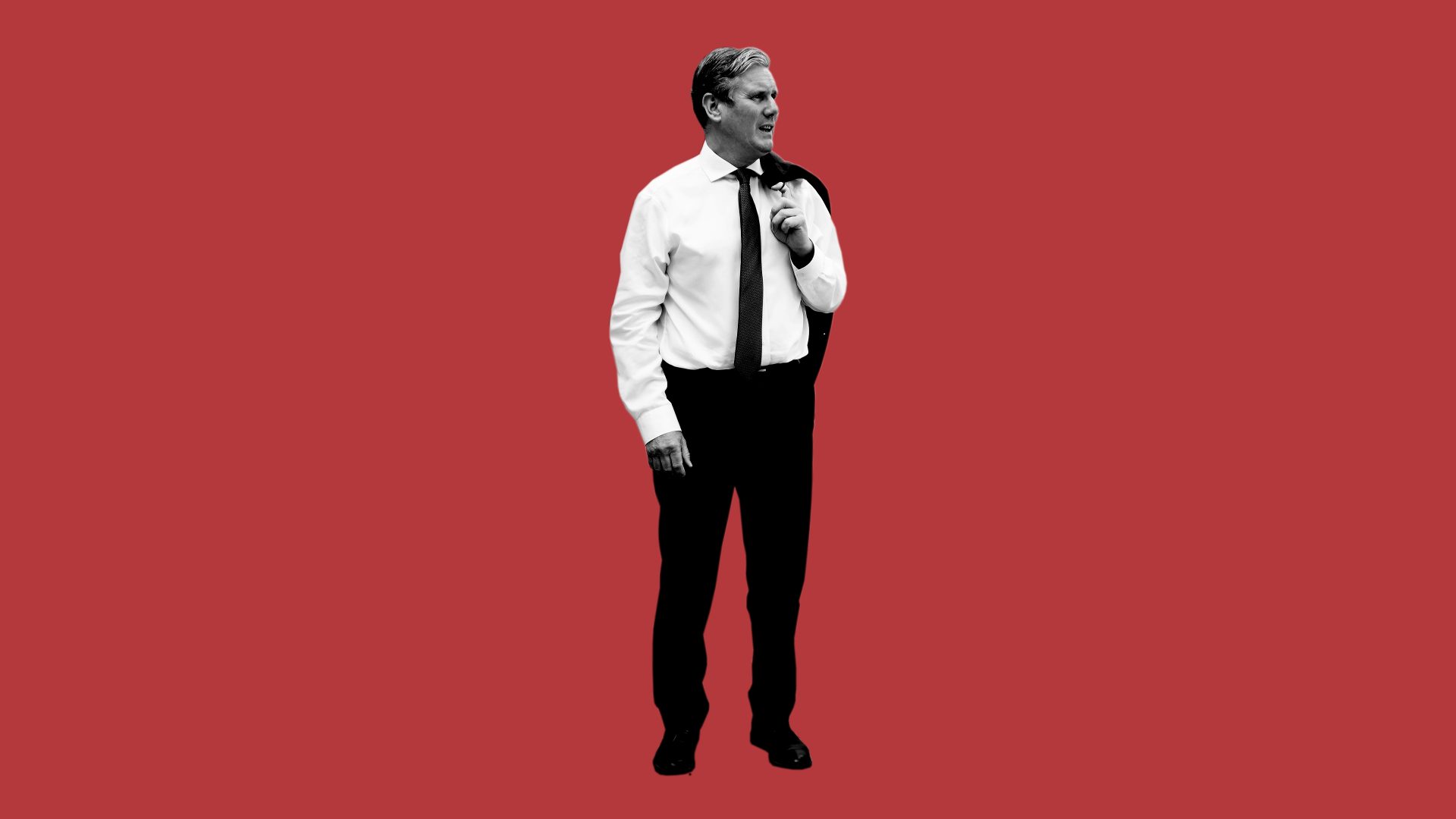Keir Starmer’s favourite slogan is “country not party”. He repeats the words so often they have become another ubiquitous, fleeting soundbite. But what does he mean by “country before party”? Should he seek to rise above party politics in this way? Does he have any intention of doing so?
Like the slogans of the New Labour era – “prudence for a purpose”, “the radical centre” – Starmer’s words are more revealing than they appear, and shine a light on the government’s unsteady start.
On a superficial level, the reason Starmer clings to the slogan is obvious. In order to win an election, and to keep winning, a party must look beyond itself to the wider electorate, or “the country”. One of the failings of the Conservative era was that fragile leaders could not look beyond their party if they wanted to survive for more than ten minutes. The country did not get a look in.
Yet Starmer’s assertion about country over party is odd. It implies that the interests of his party clash with those of the country. Is Starmer suggesting that he will protect voters from his reckless party by being the apolitical leader that takes decisions on the basis of technocratic judgements?
If so, he turns away from the essence of democratic politics in which parties debate what is in the best interests of the country. There is no objective truth, but contrasting views as expressed between competing parties. Starmer suggests he is stepping aside from such an arena.
This is a stance that gives others with more ideological self-confidence vast amounts of space. Even though the Conservatives were slaughtered in the July election their leadership contest is bursting with ideas. Most of them are bonkers, but if they are not challenged in a battle of ideas they risk becoming part of the political orthodoxy once more.
The debate is shaped in the Tory and Reform parties around a smaller state that “sets people free”, along with the fantasy that Brexit will work better when taxes are lower and EU regulations are cast to one side, the ECHR undermines parliamentary sovereignty and the need for the boats to be stopped altogether.
If Starmer’s response is that he stands for “service”, an apolitical term, the agenda of his government, some of it bolder than is widely recognised, lacks clear definition. If he is successful in securing economic growth and improves public services his favourite slogan will suggest this was in spite of his party. Starmer and his cabinet colleagues need to explain why they are implementing policies that contrast with the ideas and proposals that opponents are making. “Service” and “duty” are not an explanation.
There is also a big twist in relation to his favourite slogan. In several significant ways Starmer puts party before country. He is not unusual. Every successful leader does so to some extent, judging what they need to say to win an election even if they do not believe the subsequent policies are the most beneficial for the country.
Starmer has chosen to be unusually constrained in order to advance what he sees as the interests of his party. He and every member of his cabinet voted Remain in the 2016 referendum. They all knew then, and know now, that the economic consequences of Brexit have been dire for the country.
But in order to win the election Starmer judged it necessary to rule out joining the single market and the customs union. He will know that this is not in the country’s interests but concluded his party would be more likely to win if he did so.
This is a matter of judgement. In my view the scale of the anti-Tory mood at the election combined with polls suggesting widespread disillusionment with Brexit gave him the space to keep the door slightly ajar. I accept that it is much easier for commentators to make that judgement than a leader trying to win an election surrounded by noisy Brexit supporting Tory newspapers crying betrayal if Starmer has a coffee in Paris.
Nonetheless his stance is not in the country’s interest, as several business leaders made clear at the impressive investment summit, held recently. Ruling out membership of the single market and customs union was a case of party before country, a lever of economic growth untouched.
The same applies to the thorny issue of taxation. In order to win the election Starmer and Rachel Reeves made pledges that were not in the interests of the country, ruling out the big revenue raising taxes. As Reeves prepares for this month’s budget, she cannot touch income tax, national insurance for employees, VAT or corporation tax.
I know of no one in the current government who believes privately that the big cuts in national insurance in the dying days of Rishi Sunak’s government were in the interests of the country. Indeed there are few Tories willing to defend them with conviction and quite a lot who would support their reversal.
Reeves is planning to increase NI for employers but will face a barrage of hostile coverage for arguably breaking her pre-election pledges on national insurance. She is right to increase tax. She has no choice but to do so. But in the interests of the party, she and Starmer took the most defensive route to power, pretending that a tax on non-doms and private schools was all that was required.
Even Tony Blair and Gordon Brown, fearful of the UK’s deranged pre-election “tax and spend” debate, left open the possibility of national insurance increases. The extremely narrow view of party interest before the election now leaves Starmer and Reeves facing questions about trust, as they do the right thing for the country in the budget.
The last government made spending commitments without knowing how it would pay for them. Even the tax cuts were not properly funded. In spite of himself Sunak had become Liz Truss-like in his desperate recklessness at the end.
His prime ministerial career formed a dark arc, rising from the ashes of Truss’s mad experiment, he was the personification of fiscal conservatism only to end up announcing unfunded tax cuts. Why not make the argument to an electorate that had turned away from the Tories decisively? There was space to do so.
Now Starmer has appointed the brilliant campaigner, Morgan McSweeney to be his chief of staff. A figure that guided his party towards a landslide is now responsible for making Number 10 and the wider government work smoothly.
Usually a chief of staff is more focused on country rather than party, while being wholly supportive of the prime minister. Blair’s chief of staff, Jonathan Powell, spent no time assessing how Labour might fare at the next election. Nor did Ed Llewellyn, David Cameron’s equivalent to Powell, focus on the Tories’ electoral fortunes.
Inevitably McSweeney will obsessively pay attention to the fate of his party. With his eye on Brexit voters who switched to Labour in July, could his mighty influence lead to even greater caution in relation to Europe or a bigger “crackdown” on immigration while job vacancies in the UK continue to grow? In response to such advice, will Starmer act in the interests of the country or what he considers to be those of his party? Already there is much talk in Number 10 and beyond about what is required to win the second term.
So there should be, but ultimately the art of leadership at the highest level is to blend party interest with the country’s, to show how a party’s values lead to policies that benefit the wider electorate.
If a country is doing well, the governing party will benefit even if a prime minister takes decisions that risk short term unpopularity and screaming headlines in newspapers that are then followed up by the BBC. A Labour government’s popularity will strengthen if the unjustified ideological verve on the right is challenged by the same confidence on the centre left. After all, the centre left has recently won a landslide.
In 2010, having won no majority, Cameron quickly initiated a programme rooted in radical right-wing thinking. He considered it to be in his country’s interests and his party’s. Having won a landslide, Starmer is more hesitant, because of pre-election pledges and a lack of ideological self-confidence.
But if he judges that it is in the interests of the country to move significantly closer to Europe, to substantially increase investment to improve public services and infrastructure, it will be in the interests of the country and his party when the next election hoves into view.
Steve Richards presents the Rock N Roll Politics podcast. His next live show is at Kings Place on November 27th












